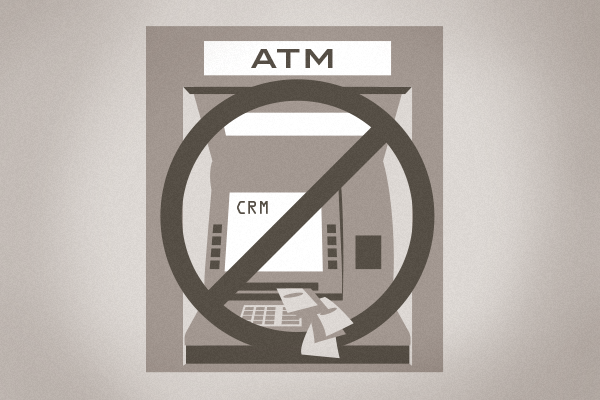 Glenn Tullman was the CEO of AllScripts, an EHR company, until his departure last year. We believe his latest op/ed piece illuminates the peril of government inserting itself into business. Sure, they come in with good intentions, but they end up stifling the quality of products on the free market.
Glenn Tullman was the CEO of AllScripts, an EHR company, until his departure last year. We believe his latest op/ed piece illuminates the peril of government inserting itself into business. Sure, they come in with good intentions, but they end up stifling the quality of products on the free market.
Category Archives: Announcements
We’re Listening To Both Sides Of The EHR Story
We’re Making Atlas.md For YOU, Not EVERYONE
 You may or may not know Dan Slinker. He’s taught journalism at Columbia College Chicago and was a Knight Fellow at Stanford University. He also created the controversially hilarious fake Twitter account @mayoremanuel.
You may or may not know Dan Slinker. He’s taught journalism at Columbia College Chicago and was a Knight Fellow at Stanford University. He also created the controversially hilarious fake Twitter account @mayoremanuel.
He’s written a great article you should read here. His piece is entitled “Oh God, Don’t Make Things For ‘Everyone.’” and even though he’s writing about Vertigo Comics, a subsidiary of DC Comics, his point rings true with Atlas.md.
Meet Scott Borden, the HSA Guy
 Scott Borden is “a passionate Health Savings Account (HSA) expert [whose] background has been in health insurance marketing and management for 23 years” according to a recent interview with Mary Pat Whaley from ManageMyPractice.com.
Scott Borden is “a passionate Health Savings Account (HSA) expert [whose] background has been in health insurance marketing and management for 23 years” according to a recent interview with Mary Pat Whaley from ManageMyPractice.com.
Borden’s company Direct Pay Consulting provides services like conversion planning and execution, patient insurance education, management of wait-listed patients and much more.

Let’s Adopt EHR For Better Patient Care, Not Federal Benefits
Xavier E. Martinez wrote about Why EHR Adoption Rates Vary Across Certain Specialties. A recent joint study from CareCloud and QuantiaMD shows that 82% of cardiologists have adopted EHR software, the most of any specialty. Overall, the article isn’t fully fleshed out. However, it raises an interesting question: Do heart doctors use EHR more widely because of their immersion in technology?
Martinez thinks so.
Practice Profitability! (Insert Sarcasm)
The stats are in. Looks like some doctors are doing a day’s worth of paperwork every week. There’s something clearly wrong with that picture. In the spirit of things not working in healthcare, here’s a well-designed infographic on where profits are headed for our industry as a whole.

David Shaywitz Asks Healthcare Customer Service, Why Not Us?
David Shaywitz wanted to get a flu shot for his child. So he used an app to find a location. The situation went awry and he wrote about it for Forbes. He was misdirected to a location that could not vaccinate his children, and then got the “we’ll transfer you to so-and-so” runaround at his own doctor’s office, culminating in multiple visits and “you’ve-got-to-be-kidding”-length waits.
Through his unfortunate experience he made three brilliant observations:
Okay, So The Free Market Isn’t Exactly “Free”
First things first, The Atlantic published a Health article online recently. It’s a doozy, and after reading it, we did wonder, did it need to be this long?
However, it addresses a poignant issue: Drug companies are motivated by malleable policies that end up creating more incentive for hair regrowth drugs than ones fighting global diseases that are “Biblically”-severe i.e. malaria, Dengue fever and others.

EPIC Fail in EHR/EMR
Here’s a quick rundown of factors contributing to EPIC’s EHR software failure. (Previous link no longer available.)
TENS OF THOUSANDS OF FEATURES
Microsoft Word has approximately 1,200 features/functions (this is rough estimate), most of which are ignored by common users. The problem with EHR software, though, is that the market is filled with hoodwinking, one-size-fits-all “solutions” all gimmicking for doctor’s dollars. MS Word has a core base of users (the entire professional, semi-professional and college-educated world) who are familiar with core procedures and who can adapt to new features with each version. EHR/EMR software DOES NOT HAVE THIS ADVANTAGE. Asking people to sift through tens of thousands of buttons and features to “figure out” how to do something is an exercise in futility. Yet it actually happens on the marketplace.
Insurance Companies Are Not Fighting Fair
Check out this May 8 article by The New York Times. They present government data suggesting that hospitals are charging upwards of 400% of actual costs for non-optional procedures.
It’s a complex issue but the worrisome fact is that competing hospitals are charging wildly different rates for similar procedures based on whether a patient is using Medicare, private insurance or isn’t insured. The worst news is that hospitals might be charging the highest rates to uninsured people to cover their bottom line.
Here’s where hospitals are taking a hit:
Fox News Columbia, South Carolina Reports On Concierge Medicine
MDVIP charges $1,500/year retainer, which comes to $125/month, a reasonable fee. However, the program operates within Medicare and traditional insurance payment. We sent out an email to find out more about what the retainer actually covers besides “all-access.” Mostly we’re curious if there are any benefits to the program that don’t entail insurance.